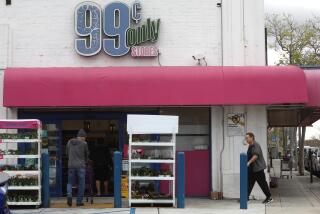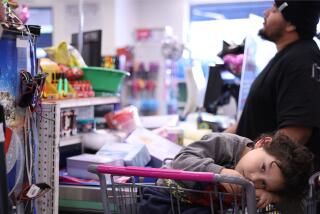Partners Put Discount Warehouse On-Line : After trials and errors, Price Club-like stores specializing in personal computers turn profitable.
- Share via
FOUNTAIN VALLEY — In the late 1980s, Arthur Hsiao, a wealthy Taiwanese immigrant, owned a computer plant in Carson. He envisioned creating a high-volume, low-price business retailing personal computers.
At about the same time, Peter Tsoi, a civil engineer from Hong Kong working for Bechtel Corp. in Tennessee, figured he had the marketing savvy to go into business for himself.
The two were brought together four years ago by mutual friends in Orange County. And over tea in a Long Beach restaurant, they formed a partnership.
The goal was to build a retail chain that would be to personal computer users what stores such as Price Club are to many budget-conscious consumers in Southern California.
The agreement was that Hsiao would provide the capital to acquire a small computer retail store in Santa Ana, then called PC Warehouse, and Tsoi would manage it and use it as the seed for a computer retailing chain.
As part of the pact, the two agreed to sell Hsiao’s Super Computer Inc. products as the house brand in their renamed Super Computer Center.
It sounded so easy.
But Tsoi, who has no background in retail marketing, found 1988 to be a year of struggle and interrupted sleep.
A few days before opening the 16,000-square-foot Santa Ana store that June, Tsoi found he had a lot more floor space than he could fill with his $500,000 worth of stock.
To make the store appear well-equipped, Tsoi recalls, he stuffed empty computer boxes with rocks and whatever else he could find and put them on display “so that we could look like a credible enterprise to our customers.”
One chore of all the clerks on opening day was to “make sure that we didn’t make the mistake of giving our customers the boxes of junk.”
Tsoi learned the hard way that wiring an alarm system to the front and back doors wasn’t enough to keep burglars away. By the end of the first year, every window in the store had been broken and burglars had hauled away about $50,000 in merchandise.
“Every time they broke into the store, I got calls from the police in the middle of the night, and I had to drive down from Long Beach to check the store,” Tsoi said. “This happened at least 20 times.”
Tsoi, 38, and Hsiao, 32, also learned that store location is critical to survival--the crooks were finding the place more easily than the customers. So they scouted around for a better and safer location.
Because they run a warehouse-type of discount store, they thought it would be sensible to put it close to an existing discount outlet to take advantage of its price-conscious consumers.
So Tsoi opened four more Super Computer Centers during the first year--in Fullerton, Torrance, Sepulveda and Montclair--and placed each in sight of a Price Club store.
And in mid-1990, as the chain started its second year, Tsoi moved the original Santa Ana store to Fountain Valley, across from a new Price Club center.
The gamble paid off, and sales, which had hit $3 million the first year, more than doubled to $7.8 million in the company’s fiscal 1990.
Unlike Price Club, which it emulates in other ways, Super Computer Center is not a membership organization. It operates much like any retail company, but eschews fancy displays and carries a huge inventory.
Tsoi’s stores carry a multitude of brands, but only those that can be discounted and that sell quickly. The stores also provide installation, loading and configuration of software and hardware services and on-site training for customers.
Tsoi also found that his business got one unexpected benefit from the recession--the high rate of staff turnover in his stores came to a standstill because there are fewer job opportunities for workers elsewhere.
Tsoi and Hsiao also used their high-volume purchasing to negotiate new credit lines from computer manufacturers. Typically, Super Computer Center pays for merchandise 90 to 120 days after it is received. The industry standard is 60 to 90 days.
Tsoi also is pushing to sign up corporate clients. One of the first agreements was with Rockwell International Corp., which allows its employees to order computers for their personal use from Tsoi’s stores. Rockwell pays Super Computer Center direct and is reimbursed by the employees through regular payroll deductions.
Hsiao and Tsoi said they plan to expand into Northern California, but not until 1994. By then, they said, they should have three more stores in Southern California, for a total of eight.
In their first fiscal year, the five existing stores posted a combined loss of $75,000.
But in fiscal 1990 the privately owned chain posted net earnings of about $230,000. And despite the recession, the company’s growth continued in the first half of 1991 as revenue for the 12 months ended June 30 hit $10 million and profits totaled about $300,000, Tsoi said. The stores have been averaging combined sales of $1.2 million a month since August, he said.
To make the operation profitable, Tsoi keeps a tight rein on overhead. Right now, this means paying low rent and hiring a small team of 40 young employees who enjoy working in the computer retail business and are willing to forgo health and dental insurance.
“Right from the start, we ran our stores like we’re in a recession,” Tsoi said.
More to Read
Inside the business of entertainment
The Wide Shot brings you news, analysis and insights on everything from streaming wars to production — and what it all means for the future.
You may occasionally receive promotional content from the Los Angeles Times.










